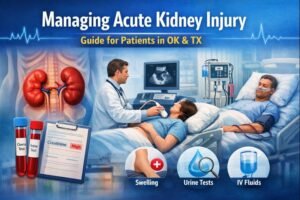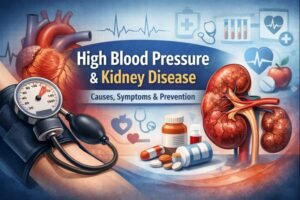Getting diagnosed with end-stage renal disease is life-changing—but it is not the end of the road. It just means life needs to look a little different now. With a strong plan, consistent care, and the right mindset, you can still enjoy your days fully. It is not about perfection—it is about progress. By learning what works for your body and making steady choices, you gain back control over your health and your future.
What Is End-Stage Renal Disease?
End-stage renal disease happens when the kidneys can no longer do their job—filtering waste, balancing fluids, and supporting other key body functions. At this stage, kidney damage is considered permanent. That means treatment becomes essential to keep the body in balance.
Most people with ESRD begin dialysis treatment or prepare for a kidney transplant. These therapies replace lost function and help maintain overall health. While the term “end-stage” sounds final, it is the beginning of a different kind of care—one that focuses on stability, strength, and adjusting your lifestyle to support long-term wellness.
Treatment Options That Support Daily Living
Living with end-stage renal disease means making treatment part of your daily rhythm—but it does not have to take over your life. Most people begin with either dialysis treatment or explore the possibility of a kidney transplant.
Dialysis comes in different forms. You can receive it at a clinic or manage it at home. Some choose in-center care for routine and support, while others prefer the freedom of home dialysis. It depends on what works best for you.
A transplant might also be an option. It can bring more independence, but not everyone is eligible right away. No matter where you start, your care plan should reflect your goals, your lifestyle, and what makes you feel your best.
Lifestyle Adjustments That Make a Big Impact
Managing end-stage renal disease goes beyond treatment—it is also about how you live each day. Small, steady changes can improve your energy, mood, and overall well-being. A kidney-friendly diet helps manage fluid levels, control blood pressure, and reduce stress on your body.
That means watching your intake of sodium, phosphorus, and potassium, and staying hydrated in ways that support your care plan. Movement matters, too. Gentle activities like walking or stretching can improve circulation and lift your spirits.
Sleep, stress, and mental focus all play a role in how you feel. Taking time to rest, staying connected with others, and building daily routines can bring structure and peace to your care. Little by little, these choices shape a stronger, more balanced life.
Emotional and Mental Well-being on the ESRD Journey
The end-stage renal disease changes your life—and not just physically. It can weigh heavily on your emotions. Feeling tired, frustrated, or disconnected sometimes is completely normal. What matters most is knowing you do not have to carry that weight alone.
Find people who understand. Whether it is a support group, a therapist, or someone close to you, talking helps. Staying connected can ease stress and bring a sense of calm during hard days.
Emotional health shapes how you face the journey. When your mind feels supported, your body follows. We believe mental wellness should be part of every care plan—because how you feel truly matters.
Partnering with the Right Care Team for Support
The right care team makes all the difference when you are managing end-stage renal disease. You need more than a treatment plan—you need people who listen, guide and walk with you through each stage of care.
We believe support should feel personal. From nephrologists to dietitians and social workers, your team should understand your goals and adjust your care around them. Clear communication, trust, and shared decisions form the foundation. When your team feels like partners, care becomes more than routine—it becomes empowering.
Stay Empowered, Stay Engaged
End-stage renal disease may change your path, but it does not define your future. Staying informed, making thoughtful choices, and leaning on the right support can help you live well—day by day. At Southern Oklahoma Kidney Center, we are here to walk with you. Together, we will focus on care that supports not just survival, but strength.




